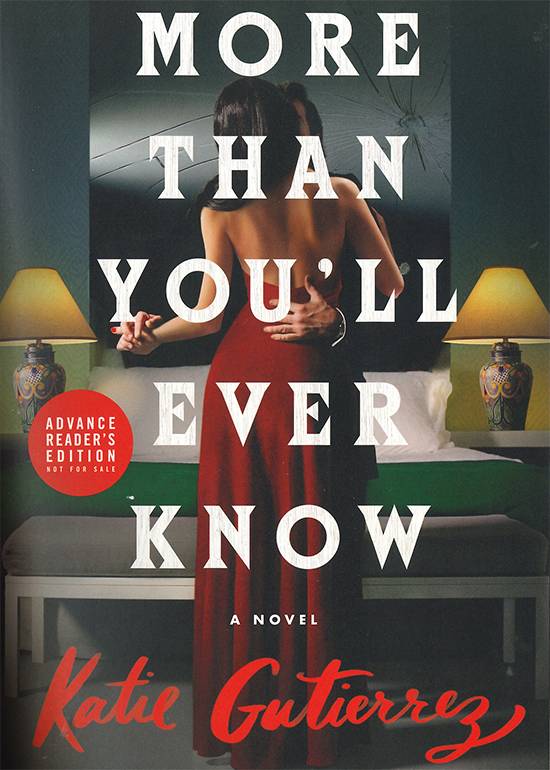An Introspective Thriller

More Than You’ll Ever Know
by Katie Gutierrez
Harper Collins, 2022.
448 pp. $28.99 Hardcover.
Reviewed by
Olivia Murr
Gutierrez’s debut, More Than You’ll Ever Know, is an ambitious thriller, weaving in elements of domestic drama and character study. The story follows novice true-crime journalist Cassie Bowman in 2017 as she interviews Lore Rivera. From 1983 to 1986, Lore—a bigamist—lived two separate lives, both of which collide violently when one of her husbands, Andres, winds up dead. The novel stands out for exploring the depth of human emotion and the struggle to maintain one’s individuality in a thought-provoking way.
Early on, Cassie considers the grim realities of her job saying: “I felt like a forager of other people’s tragedies, grinning as I presented them like trophies to an invisible bloodthirsty crowd.” Gutierrez, however, does not treat her story as a voyeuristic display of human depravity, as the novel focuses more on the intricacies of Lore’s double life and the flaws in Cassie’s relationships, not the crime. Journalist and subject begin to rely on each other even though Lore’s past and flair for lying make trust nigh impossible, creating a compelling emotional connection between the novel’s two leads. The story has heart and earnestly questions what could lead someone to betray the trust of their loved ones. Lore is a nuanced character, and Gutierrez showcases her guilt and isolation as she struggles through the pressures of family life and the stress of a financial recession. She is not the stereotypical scheming woman seen in thrillers such as Gillian Flynn’s Gone Girl. While both Amy Dunne and Lore Rivera experience dissatisfaction with their husbands and situation in life, Lore’s desire for more is presented as incredibly human. Though thoughts of resentment toward her husband, Fabian, and their children—who she feels have diminished her—creep in, her love for them is clear, often seen in the guilt she feels that—when it comes to her happiness—they are not enough. In her mind, only a life with Andres can help her continue to explore new facets within herself. Therefore, her greed is positioned as coming from a place of longing and not vindictiveness. Lore goes to great lengths to secure her happy ending, but ultimately draws the line when the repercussions threaten her family, showing the intensity of her love in spite of her selfishness.
Another strong element of the writing is the vivid description. Lore describes their neighborhood as filled with abandoned houses, “the city scattered with the carcasses of dreams.” Not only does Gutierrez plant a clear image in her reader's mind, but she also captures a mood, illustrating the sorrow and emptiness the downturn has brought to their community. The atmospheric nature of her writing draws readers further into the realities of Laredo and Mexico City as Lore experiences them.
However, More Than You’ll Ever Know puts the slow in slow-burn. Lore and Cassie’s character journeys are key to establishing emotional depth, but despite that, the story could use a trim. After establishing how Lore’s dual life started, the chapters centered on her past feel like a long denouement. Subsequent chapters focused on Lore become shorter and more compressed, divulging the pieces of the puzzle that is Andre’s death in quick succession. The effect of this is excellent, with the readers feeling as if they are racing toward a dramatic conclusion and this compression of time on the page could have been utilized earlier.
Despite the length, Gutierrez maintains suspense and is adept at plot twists—though not every twist lands. As the reader learns the facts of the crime alongside Cassie, the cracks in Lore’s story become clearer, prompting a reconsideration of the age-old question: whodunnit? The story's conclusion comes with so many red herrings even a well-seasoned author would struggle to pull them off. While subtle allusions to the real murderer are woven in, two of the three potential perpetrators are revealed only near the conclusion. Though Gutierrez succeeds in obscuring the motives of the true culprit until the end while peppering in clues, the conclusion still feels slightly formulaic.
Overall, Gutierrez handles a novel centered on betrayal, trust, and the lengths one will go to for love with incredible nuance. She allows the characters’ thoughts and actions to exist on the page without moralizing or picking a side, showing both the virtues and vices of human nature. Despite having some unpolished spots, More Than You’ll Ever Know is a solid debut and a stimulating read.
Olivia Murr is a graduate student at Texas State University.
